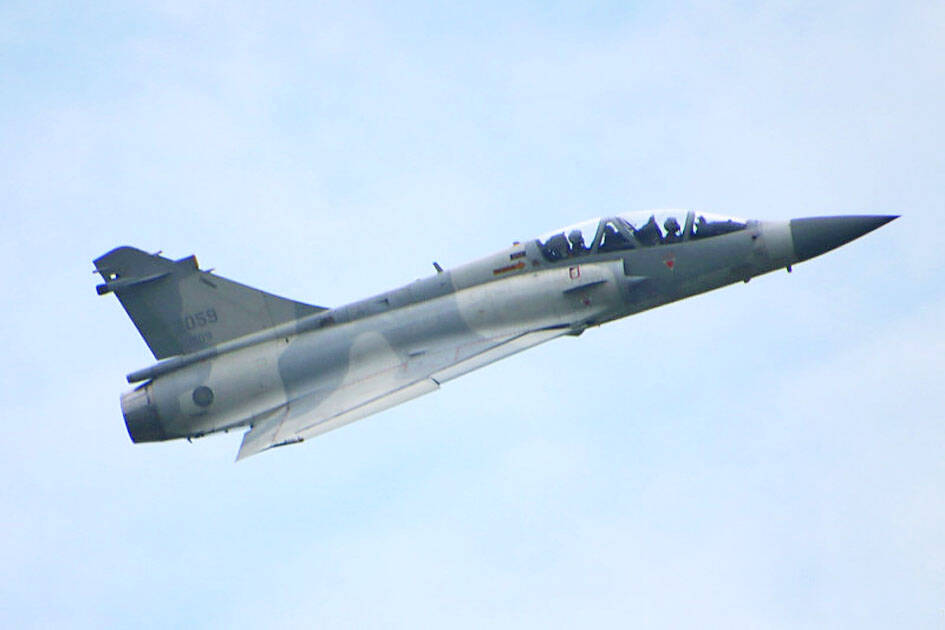A Republic of China Air Force Dassault Mirage 2000 fighter jet crashed at 8:35pm yesterday during a training exercise over waters off Hsinchu County, and pilot Hsieh Pei-hsun (謝沛勳), who successfully ejected, has been rescued, the Ministry of National Defense said.
Ocean Affairs Council Minister Kuan Bi-ling (管碧玲) confirmed through a post on her Facebook page at 10:47pm that Hsieh was conscious and has been transferred to a hospital for further observations.
Military sources said Hsieh was located and brought onboard a Coast Guard Administration vessel at around 10:39pm. His life signs were stable.

Photo: Taipei Times
The French-built Mirage was conducting nighttime exercises when it suffered a suspected loss of power and the pilot then bailed out, the ministry said.
President William Lai (賴清德) this morning visited the pilot at Tungs’ Taichung MetroHarbor Hospital, where he thanked the armed forces on behalf of the country.
Hsieh is doing well and is in stable condition, Lai said.
Wei Chih-wei (魏智偉), head of the hospital’s emergency room, said that Hsieh came in with contusions to his neck, back and hands due to his ejection into the sea, but no internal bleeding or obvious spinal injuries.
He is currently able to walk around and use the facilities on his own, Wei added.
Taiwan’s air force has suffered a series of crashes in recent years, including in 2022 when it grounded its Mirage fleet after one crashed into the sea off the east coast.
Taiwan received its first of 60 Mirage 2000 jets in 1997, although they have been upgraded several times since then.
At least seven have since been lost in accidents.
While Taiwan’s air force is well trained, it has been repeatedly scrambling to see off Chinese military aircraft flying near the nation in the past five years, although the accidents have not been linked in any way to these intercept activities.
The US-built F-16 jet is the mainstay of Taiwan’s air force.
Additional reporting by CNA and Reuters

MORE VISITORS: The Tourism Administration said that it is seeing positive prospects in its efforts to expand the tourism market in North America and Europe Taiwan has been ranked as the cheapest place in the world to travel to this year, based on a list recommended by NerdWallet. The San Francisco-based personal finance company said that Taiwan topped the list of 16 nations it chose for budget travelers because US tourists do not need visas and travelers can easily have a good meal for less than US$10. A bus ride in Taipei costs just under US$0.50, while subway rides start at US$0.60, the firm said, adding that public transportation in Taiwan is easy to navigate. The firm also called Taiwan a “food lover’s paradise,” citing inexpensive breakfast stalls

TRADE: A mandatory declaration of origin for manufactured goods bound for the US is to take effect on May 7 to block China from exploiting Taiwan’s trade channels All products manufactured in Taiwan and exported to the US must include a signed declaration of origin starting on May 7, the Bureau of Foreign Trade announced yesterday. US President Donald Trump on April 2 imposed a 32 percent tariff on imports from Taiwan, but one week later announced a 90-day pause on its implementation. However, a universal 10 percent tariff was immediately applied to most imports from around the world. On April 12, the Trump administration further exempted computers, smartphones and semiconductors from the new tariffs. In response, President William Lai’s (賴清德) administration has introduced a series of countermeasures to support affected

CROSS-STRAIT: The vast majority of Taiwanese support maintaining the ‘status quo,’ while concern is rising about Beijing’s influence operations More than eight out of 10 Taiwanese reject Beijing’s “one country, two systems” framework for cross-strait relations, according to a survey released by the Mainland Affairs Council (MAC) on Thursday. The MAC’s latest quarterly survey found that 84.4 percent of respondents opposed Beijing’s “one country, two systems” formula for handling cross-strait relations — a figure consistent with past polling. Over the past three years, opposition to the framework has remained high, ranging from a low of 83.6 percent in April 2023 to a peak of 89.6 percent in April last year. In the most recent poll, 82.5 percent also rejected China’s

PLUGGING HOLES: The amendments would bring the legislation in line with systems found in other countries such as Japan and the US, Legislator Chen Kuan-ting said Democratic Progressive Party (DPP) Legislator Chen Kuan-ting (陳冠廷) has proposed amending national security legislation amid a spate of espionage cases. Potential gaps in security vetting procedures for personnel with access to sensitive information prompted him to propose the amendments, which would introduce changes to Article 14 of the Classified National Security Information Protection Act (國家機密保護法), Chen said yesterday. The proposal, which aims to enhance interagency vetting procedures and reduce the risk of classified information leaks, would establish a comprehensive security clearance system in Taiwan, he said. The amendment would require character and loyalty checks for civil servants and intelligence personnel prior to